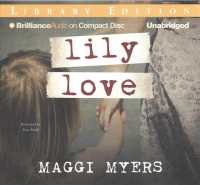Full Description
This collection critically examines the opportunities and challenges associated with the use of AI-based tools in translation, which have rapidly transformed the language industry in recent years.
This volume is divided into three sections that explore the use of AI-based tools in specific domains or on specific phenomena. While the first section addresses the impact of AI-enhanced translation on both workflows and outputs from the lens of creativity and idiomaticity, the second section examines key questions concerning the use of AI-based translation tools in various domains from technology to tourism. Contributions in the third section analyze AI-induced changes in the areas of media accessibility and journalism, as well as taking a critical look at evolving job perspectives and job profiles within the language industry. Taken together, the chapters in this volume envisage sustainable forms of interaction between humans and machines that put humans at the center of AI-induced technological changes.
This book will be of interest to students and scholars in translation studies, particularly those working in translation technology, audiovisual translation, and literary translation, as well as practicing translators.
Contents
Foreword; 1. Introduction - Katharina Walter and Marco Agnetta. Part 1: From Code to Creativity: Negotiating Linguistic Diversity in AI-enhanced Translation - 2. Creativity in Literary Post-editing: Reworking a German DeepL Translation of a Text by Lima Barreto - Waltraud Kolb; 3. Jeopardizing Linguistic Diversity: How AI-generated Translations Neutralize Vernacular Irish English - Katharina Walter; 4. Video Game Translation and Creativity in the Age of Artificial Intelligence - Judith Brenner and Maarit Koponen; 5. Using LLMs and NMT to Identify and Transcreate Culture-specific Items from English to Polish - Urszula Paradowska; 6. Translating Creative Language with(out) AI-based Tools: Evidence from a General Translation Course at University of Cyprus - Maria Constantinou. Part 2: Specialized Translation with AI-based Tools: Domain-specific Issues from Prompting to Paremiology - 7. Text-generative Large Language Models in Specialized Translation: Not Only Suitable for Translation - Barbara Heinisch; 8. Transcreation in the Tourism Domain: Is Artificial Intelligence Up to the Task? - Sandra Navarro; 9. Effectiveness of AI Pre-trained Models in the Translation of Agri-food Texts (German-Spanish) - María del Carmen Balbuena Torezano; 10. AI-enhanced Translation and the Paremiology of Andalusian Olive Oil - Alba Montes Sánchez. Part 3: AI-induced Changes in the Language Industry: New Perspectives from Media Accessibility to Occupational Profiles - 11. Between Empowerment and Dependency: Digital and AI-supported Tools and Media Accessibility - Marco Agnetta; 12. (Tout) simplement and juste: French Equivalents of the German Modal Particle einfach in Human and Neural Machine Translation—Evidence from Switzerland's Multilingual Press - Franz Meier; 13. Libyan Translators' Attitudes towards the Profession in the Era of Automation: An Interview Survey Study - Naeimah Al Swuee Ali Ali and Mohamed Babchikh.







